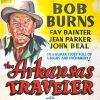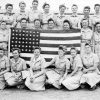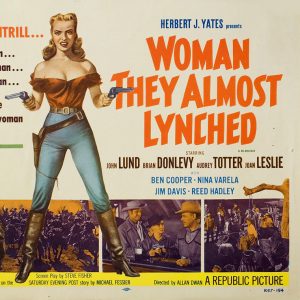calsfoundation@cals.org
Woman They Almost Lynched
An interesting film lurking behind an exploitative title, Republic Pictures’ 1953 western Woman They Almost Lynched is set in early 1865 in “Border City,” a fictitious Ozarks town bisected by the Arkansas-Missouri border. The town has been militantly neutral throughout the Civil War, under a “petticoat government” led by tyrannical mayor Delilah Courtney (Nina Varela).
Made in California, the movie is a typical B-western (though better than most) with no real Arkansas atmosphere except one old man with a mandolin. The town and the rural scenery look like routine Hollywood western locales. None of the hillbilly stereotypes found in other Hollywood films set in Arkansas are present, and no one attempts a local accent. Border City is said to attract deserters, ruffians, and saloon girls from all over—there is a Hispanic character (unlikely in Arkansas in 1865), and the heroine, Sally (Joan Leslie), is fresh from Michigan.
Directed by Allan Dwan, the film is best remembered as one of the few westerns dominated by female characters. Delilah is mayor because “no man had courage enough for the job.” She does not punish men for gunfights (to help reduce the riffraff), but she firmly maintains neutrality and lynches without trial anyone caught supporting either the North or the South. Border ruffian William Quantrill (Brian Donlevy) tells Delilah, “You don’t spit and scratch. You punch.” A young Jesse James says Kate Quantrill (Audrey Totter) is “more cold-blooded than any man I’ve ever seen.” Other dialogue by male characters displays the same theme: “No man alive can be as mean as a woman”; “Listen to her. She thinks she’s a man”; “She’s got a temper like nothing you’ve ever seen.” Delilah responds calmly: “They’re just men. Easy to drive.”
Schoolteacher-turned-saloon-owner Sally has a barroom fight with Kate, during which Sally punches out a cowboy who gets in the way. Sally and Kate then engage in what apparently was the first gunfight between two women in film history. The titular near-lynching is also an all-woman affair. Delilah reluctantly orders Sally hanged for violating neutrality but is delighted when a reformed Kate risks her life to clear Sally’s name.
All the main female characters undergo some kind of change over the course of the film. After both survive the gunfight, Sally and Kate become allies. Sally discards useless gentility to become a competent westerner. Kate gives up her loyalty to her abductor (and husband) Quantrill and her hatred of other women. Even the fearsome Delilah is pleased when the war ends, though it means the end of her power.
Of the three characters who portray real-life marauders in the film, Quantrill is clever and ruthless; Cole Younger is lecherous and a danger to women; and baby-faced Jesse James is chivalrous and insists that men treat Sally like a lady. Both the Confederacy—represented by a Rebel spy (John Lund)—and the easily fooled Union forces are portrayed as virtuous. The Confederate government is given credit for repudiating Quantrill, whose bloody raid on Lawrence, Kansas, is mentioned. (Donlevy previously played Quantrill in 1950’s Kansas Raiders.)
Variety (April 1, 1953) said the “lightweight entertainment” was slow and talky and “makes little sense.” However, recent critics have been much more favorable about the eccentric western, which seems to have achieved cult status. Michael Pitts praises “several interesting performances,” especially by Donlevy and Totter. Phil Hardy calls it one of “Dwan’s delicious Western parodies” in which Dwan “effortlessly charms us into complicity with his mockery of the genre” with a “gloriously ridiculous” script (by Steve Fisher). After Olive Films released a Blu-ray disc of the black-and-white film in 2015, fan magazine Phantom of the Movies’ VideoScope (issue 94) noted the “increasingly ludicrous but rarely dull narrative,” and prestigious British film magazine Sight and Sound (May 2015) called Dwan’s movie “anything but run-of-the-mill” and said that it was situated in “the Border City between Trash and Art.”
Woman They Almost Lynched was released during a brief boom in women-centered westerns, after Outlaw Women (1952) and before Johnny Guitar (starring a seething Joan Crawford) and Jesse James’ Women (both 1954). In 1982, the inconsequential television film The Wild Women of Chastity Gulch starred Joan Collins as the dictatress of a neutral border town during the Civil War. The makers of this TV travesty clearly remembered Woman They Almost Lynched, but their movie—which has almost no men in the town to fear the women involved—was much less interesting than Dwan’s.
For additional information:
Hardy, Phil, ed. The Overlook Film Encyclopedia: The Western. Woodstock, NY: Overlook Press, 1994.
Martin, Len. D. The Republic Pictures Checklist. Jefferson, NC: McFarland, 2006.
Pitts, Michael R. Western Movies: A Guide to 5,105 Feature Films. 2nd ed. Jefferson, NC: McFarland, 2013.
“Woman They Almost Lynched.” Internet Movie Database. http://www.imdb.com/title/tt0046556/?ref_=fn_al_tt_1 (accessed November 18, 2020).
Michael Klossner
Little Rock, Arkansas
 Movies
Movies Women
Women World War II through the Faubus Era, 1941 through 1967
World War II through the Faubus Era, 1941 through 1967 Woman They Almost Lynched Poster
Woman They Almost Lynched Poster 



Audrey Totter is very sassy and foxy in leather cowboy pants and tall riding boots, gun belt, holster, and pistol. Mrs. Quantrill completes her cowboy drag outfit with a cowboy hat.